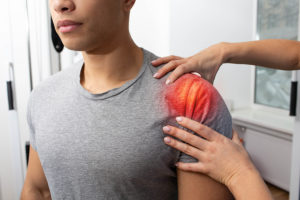A Rotator Cuff Tear Can Make It Difficult to Reach Overhead—Receive Treatment Near Colts Neck, NJ

The rotator cuff is a complex group of muscles and tendons that stabilize the shoulder and enable a wide range of motion, allowing the arm to rotate and lift. Because the shoulder joint is highly mobile and used during many daily activities, it is often prone to injury. For instance, a rotator cuff tendon can tear gradually with repetitive use or rupture suddenly through direct trauma. When a shoulder injury occurs, an accurate diagnosis and prompt treatment are important because, if left untreated, a rotator cuff tear will typically worsen with continued activity.
A hallmark sign of a rotator cuff tear is difficulty reaching overhead. Other symptoms can include shoulder pain, stiffness, and weakness. If you suspect that you have a rotator cuff injury, you are welcome to consult with an orthopedic specialist at Advanced Orthopedics and Sports Medicine Institute (AOSMI) near Colts Neck, New Jersey. In addition to a physical examination and medical history review, the diagnostic process may involve an imaging test, such as an X-ray, MRI, or ultrasound.
How Is a Rotator Cuff Injury Treated?
Depending on several factors, including the severity of the injury as well as your lifestyle and preferences, treatment for a rotator cuff tear may involve:
- Rest and activity modifications – To minimize strain on the injured shoulder, overhead lifting should be temporarily avoided.
- Physical therapy – During the healing process, gentle stretches and progressive range-of-motion exercises (which may include certain overhead movements) can be performed to help prevent frozen shoulder from developing due to immobility.
- Medications – Nonsteroidal anti-inflammatory drugs (NSAIDs) can be helpful for reducing painful swelling in and around the shoulder joint.
- Steroid injections – A local anesthetic and powerful anti-inflammatory medication (cortisone) can be injected directly into the painful area of the shoulder.
If your symptoms do not improve after several weeks of conservative therapy, a surgical repair may be considered. For instance, a board-certified, fellowship-trained orthopedic shoulder surgeon at AOSMI may suggest re-securing the torn tendon to its original attachment site on the bone with special sutures. In some cases, this procedure can be performed arthroscopically with the use of a miniature camera and tiny surgical instruments inserted through small incisions around the shoulder joint. As compared to traditional open surgery, this approach can offer several advantages, such as less pain, reduced risk of infection, faster healing, and minimal scarring.
If you would like to explore your treatment options for a rotator cuff tear, contact AOSMI today to schedule a consultation with a shoulder specialist at our orthopedic clinic near Colts Neck, NJ.







